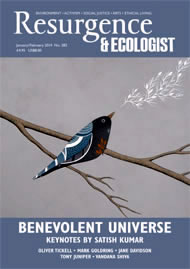On the 21st of September 2013, performing less than three months after the death of his wife Toshi, the legendary folk singer Pete Seeger (94) appeared as a surprise guest at Farm Aid’s fundraiser in New York. Towards the end of his rendition of Woody Guthrie’s This Land Is Your Land, he turned to the audience and said: “I’ve got a verse you’ve never heard before!” To huge applause, he finished it off with “New York was meant to be frack-free!”
While songs about the wonder of Nature reach far into our musical history, the use of music as a direct form of environmental activism remains strangely scarce. Seeger was one of the earliest musicians to venture into this unknown territory. In 1966, he released what many regard as the first ‘environmentalist album’, God Bless the Grass.
Many of the standout songs on this record were not written by Seeger but by his friend and collaborator Malvina Reynolds. Rather than singing about a distant forest, she focuses on environmental issues in her own back yard. The title track plays with the idea of a blade of grass battling its way through concrete. It’s a tribute to the perseverance of Nature and (God bless ...the wild grass growing at the poor man’s door), to hope. Some of the other songs are rather less subtle. In Cement Octopus, the Californian freeway system is compared to a monster whose tentacles extend across the landscape, smothering everything within reach.
The album goes on to explore ecosystems and the delicate interconnections from which they are built. As well as looking to inform though, Seeger also offers hope for the future. The only song on the album that he wrote himself, My Dirty Stream, relates to his successful campaign to clean up the Hudson River. His vision was to build a replica 18th-century sloop (a kind of sailing boat). Since it set sail in 1969, the sloop Clearwater has been inspiring people to enjoy the river and protect their local environment.
Pete Seeger has never been afraid to use his music as a platform for activism. One area that he hasn’t often commented on though, is the topic of religion. “(I used to say) I was an atheist”, he explains. “Now I say it’s all according to your definition of God. According to my definition of God, I’m not an atheist. Because I think God is everything. Whenever I open my eyes I’m looking at God. Whenever I’m listening to something I’m listening to God.”
Unlike many of his other releases, which feature Seeger performing live, God Bless the Grass was clearly recorded in a professional studio. Unfortunately, this means it’s not as natural as his other albums. The imperfections and audience participation characteristic of his earlier records were a huge part of their charm. And so although the record is hardly revolutionary from a sonic standpoint, Seeger and Reynolds were certainly ahead of their time in other ways. God Bless the Grass constitutes a significant milestone in the emergence of environmental themes within popular music. The only truly disappointing thing is that so few musicians followed its lead.
To this day talking about anything other than romance and sex is seen by many artists, as a risk rather than an opportunity. That said, it’s important to remember that music doesn’t need to make reference to Nature or environmental issues in order to say something significant about the relationship between places and people. As Mark Pedelty remarks in his book Ecomusicology, “Music is much more than organised sound. Music is movement, languages, and places”.
I only need to hear a few seconds of Arabic song in order to imagine a sea of sand dunes, the drone of a bagpipe to conjure up images of the highlands, or the relentless thud of techno to transport me to a sweaty dance floor in Berlin. Whether or not it attempts to address environmental issues as directly as God Bless the Grass, music and place are forever entwined.






